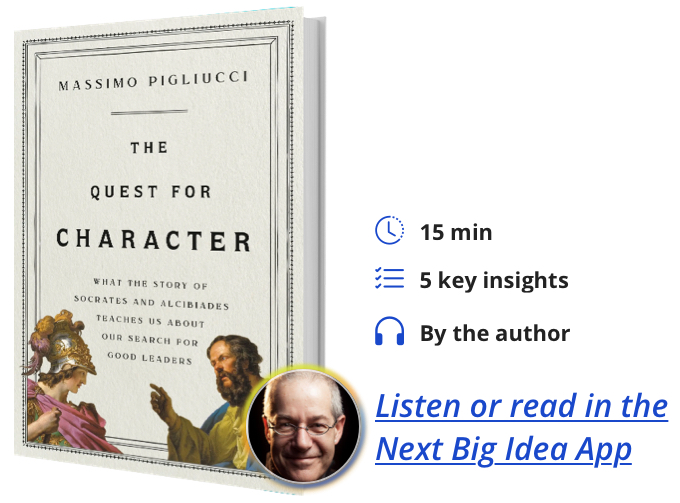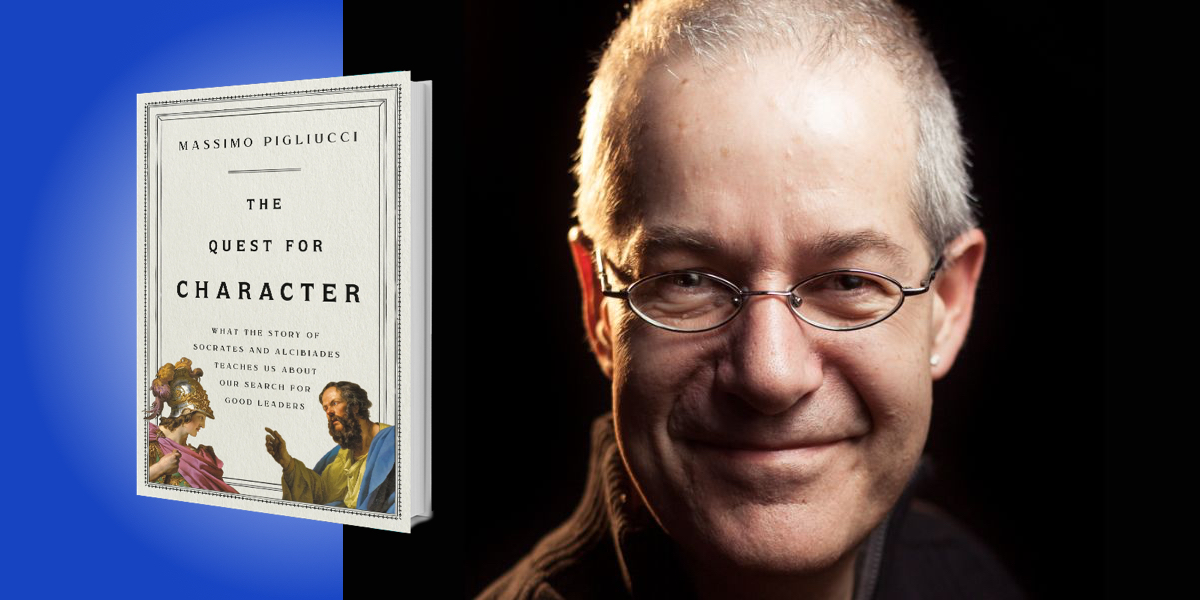Massimo Pigliucci is Professor of Philosophy at the City College of New York. He is the former co-host of the Rationally Speaking podcast, and former editor in chief of the online magazine Scientia Salon.
Below, Massimo shares 5 key insights from his new book, The Quest for Character: What the Story of Socrates and Alcibiades Teaches Us About Our Search for Good Leaders. Listen to the audio version—read by Massimo himself—in the Next Big Idea App.

1. Virtue can (and should) be taught.
Nowadays when we hear talk of virtue, we tend to think of old-fashioned Victorian characters, or the Christian virtues of hope, faith, and charity. But the word “virtue” comes from the Greek arete, which means excellence. So, a virtuous person is an excellent person, the best person they can be.
The ancient Greco-Romans thought that being excellent means performing one’s function well. For instance, I just bought an excellent bread knife. Meaning a knife that does well at what it is supposed to do: cut bread. By analogy, an excellent human being is one who does well what human beings are designed by Nature to do. Since we are highly intelligent and highly social animals, our natural function is to use our brains to solve problems, and to do so in a socially cooperative fashion. That’s how we survive and flourish as a species.
It’s not just the ancients who say so. This view of humanity jibes well with the discoveries of modern primatologists and evolutionary biologists. Large brains are our chief evolutionary weapon, and social living is a crucial characteristic of our species.
According to the Greco-Romans, virtue understood as human excellence is a skill and therefore can be taught. You become a better person by learning a bit about ethics, by following a good teacher (like Socrates), and by doing a lot of practice. But how do you practice virtue?
Suppose that you feel like you are not generous enough. One way to improve at this might be to get into the habit of putting some change into your pocket before leaving your house, and then giving that money to the first homeless person you encounter—no questions asked. This will initially be awkward, perhaps embarrassing even. But the more you do it, the more it will become second nature. Soon you will be on your way to becoming a more generous person.
2. If you are not virtuous, don’t get into politics.
Alcibiades was a friend and student of Socrates. He was impossibly handsome, rich, brave, and descended from one of the noblest families in Athens. In other words, he had everything one might want for becoming a leader—except good character.
Alcibiades went to Socrates for advice, and the philosopher basically subjected the young man to a job interview, where the job is leading Athens in the middle of the Peloponnesian War against its rival, Sparta. Socrates quickly figured out that Alcibiades did not have what it takes. He was too narcissistic, wanting to be a leader not for the good of the people, but to engage in self-aggrandizement.
“Socrates was saying that Alcibiades lacked the wisdom necessary to run the country.”
At one point Socrates laid it out bluntly to his friend, saying, “Then alas, Alcibiades, what a condition you suffer from! I hesitate to name it, but it must be said. You are wedded to stupidity, best of men, of the most extreme sort, as the argument accuses you and you accuse yourself. So this is why you are leaping into the affairs of the city before you have been educated.”
Ouch. The Greek word usually translated as “stupidity” is amatia, which is perhaps best rendered as “unwisdom.” Socrates was saying that Alcibiades lacked the wisdom necessary to run the country.
Unfortunately, Alcibiades did not follow Socrates’ advice, went into politics anyway, and—predictably—led Athens to final disaster. The moral of the story: don’t get into politics unless you have a good character and good motivations.
3. A good character is an inside job.
It turns out that when someone is not receptive to external advice, they will not fare well as statesmen. By contrast, when a leader grows up wanting to be a good person and working on behalf of others, then they do much better.
For instance, the famous philosopher Plato (the most well-known of Socrates’ students) tried instilling virtue in Dionysius the Second of Syracuse, in Sicily. He failed abysmally because Dionysius was simply not interested in anything other than self-serving behavior. In fact, Plato almost lost his life in the endeavor.
By contrast, the Roman emperor Marcus Aurelius tried to govern in the best manner possible, and he was guided by his chosen philosophy of Stoicism. The important difference with Dionysius is that Marcus wanted to do good and realized that listening to his philosophical mentor—a Stoic named Junius Rusticus—was important.
Modern scientific research supports the intuitions of the Greco-Romans: we can effectively teach ethics to young children because their brains are not yet fully formed, but only adults who are interested in self-improvement are receptive to such teachings.
4. We should all be “philosophers.”
Philosophy tends to get a bad rap. Philosophers today are imagined to be stuffy academics engaged in navel gazing, thinking deep thoughts about abstruse matters nobody else cares for. There is, unfortunately, some truth to this view.
But a philosopher in ancient Greece or Rome was someone who practiced the art of living by using critical thinking and wisdom to navigate life’s challenges. In that sense, anyone can be a philosopher, no PhD required. All you need is a functional brain and the willingness to use it.
“A philosopher of this kind will use the four cardinal virtues as a moral compass: practical wisdom, courage, justice, and temperance.”
Thus, a philosopher spends most of their time living in the here and now, paying attention to the world and the people in it, and constantly trying to handle situations in the best way possible. A philosopher of this kind will use the four cardinal virtues as a moral compass: practical wisdom, courage, justice, and temperance.
Practical wisdom is the knowledge of what truly is, or is not, good for us. Courage is the willingness to act in the right manner, even when there is a personal cost. Justice means to treat others fairly and with respect, the way we would like to be treated. And temperance means to act in right measure, neither too much nor too little.
For instance, suppose I walk into work and find my boss harassing a co-worker. I consult my moral compass. Practical wisdom tells me that it is good for my own character to be helpful to others, because it makes me a better person. Courage is required because my boss may retaliate. Justice says that if I were the one being harassed, I very much would like to have someone help diffuse the situation. In terms of temperance, my intervention should be proportionate to the situation. I don’t need to start punching my boss, but I also can’t just whisper something under my breath. I need to step in firmly but gently.
The radical Greco-Roman idea is that if we all tried to live like philosophers, the world would be a much better place.
5. What works when it comes to improving character.
Improving our character is a skill. To achieve this skill, doing nothing doesn’t work. You often hear that people become wiser as they age, but that’s not really the case. There are a lot of cranky old people who are not wise. Age is necessary to become wiser, but it isn’t sufficient by itself. It’s necessary because wisdom is acquired through experience, but that experience must come through mindful practice to result in wisdom: we need to pay attention to what happens to us and why, and actively try to learn from those experiences.
A second thing that doesn’t work is nudging. If you are a man, you have seen public urinals with a fly drawn where you are supposed to hit. That’s an example of nudging: someone designs a system that effectively manipulates people’s behaviors in a desired direction. But nudging does not improve character since it isn’t designed to do so. You will hit the fly not because you are convinced that it is good not to urinate on the floor; you’ll hit the fly because you are engaged in a game. Your motivation is not the right one.
A third thing that doesn’t work is virtue labeling—as when you tell your child that he is brilliant even though he clearly isn’t. Repeating the lie for encouragement will not make him brilliant. Hard study might.
“People tend to behave more ethically if they get into the habit of thinking about their role model.”
There are approaches that do work to develop a better character. For instance: adopting a role model. Pick someone you admire, regardless of whether you know them personally. Pick Socrates, or Buddha, or your grandmother. It doesn’t matter who you choose, so long as you always ask yourself: What would my role model do? That’s what the ancient Greco-Romans did, and empirical evidence from modern science shows they were right: people tend to behave more ethically if they get into the habit of thinking about their role model.
Another thing that works is to keep track of your progress through philosophical journaling. A good example is provided by Marcus Aurelius’s Meditations. In the book (which was really his personal diary) the Roman emperor critically examined his own behavior, repeatedly prodding himself to do better. For example, let’s say you had an altercation with your partner today. What did you do wrong? What did you do right? And what could you do better next time? By paying attention to both your mistakes and your successes, and preparing your mind for future occurrences, you gradually become better at the business of life.
One more thing that works is purposely seeking situations that train your character. For instance, let’s say you realize that you are deficient in temperance. Well, the Stoic philosopher Musonius Rufus pointed out that we have at least three occasions every day to practice temperance: at each meal. Before you start eating, remind yourself that you don’t just want to nourish yourself and enjoy good food. You also want to improve your character. Visualize ahead of time how much food and drink is reasonable, and try sticking with that throughout the actual meal. If you slip up, notice the mistake and correct it the next time around.
The idea, which goes back to Aristotle and the Stoics, is to fake it until you make it. Initially the behavior will feel awkward, but eventually it will become second nature.
Let me leave you with a quote from one of my favorite Stoic philosophers, Seneca: “Fortune has no jurisdiction over character.” What this means is that improving your character is up to you, while other things—like health, wealth, and reputation—are the result of external factors. Work on your character to be in charge of what really matters in life.
To listen to the audio version read by author Massimo Pigliucci, download the Next Big Idea App today:































